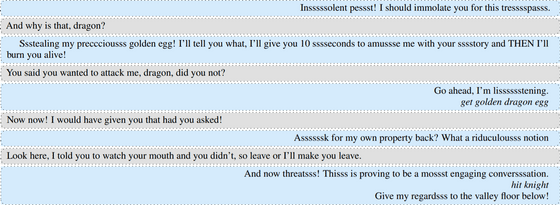A study that allows AI to talk and act 'as if it had a purpose' in a game set in a fantasy world

While playing games such as RPGs, many gamers have been disappointed that
How to Motivate Your Dragon: Teaching Goal-Driven Agents to Speak and Act in Fantasy Worlds
(PDF file) https://arxiv.org/pdf/2010.00685.pdf
Teaching AI agents to communicate and act in fantasy worlds
https://techxplore.com/news/2020-11-ai-agents-fantasy-worlds.html
In recent years, research on natural language processing (NLP) has made remarkable progress in the field of AI technology. In addition, AI technology for manipulating characters in the game has progressed to the point where AI agents can overwhelm the world's top human players.
DeepMind's AI 'Alpha Star' wins 10-1 in 'Starcraft 2' against the world's top players --GIGAZINE

However, NLP technology and 'goal-oriented agents' that make game characters act autonomously have been studied separately and rarely used in combination. So, a research team led by Prithviraj Ammanabrolu, an AI researcher at Georgia Institute of Technology, said, 'By introducing NLP technology to goal-oriented agents, we can develop AI that talks and acts with other characters. I thought, 'Isn't it?', And started research using LIGHT , a text adventure game for AI research developed by FAIR.
First, the research team asked volunteer collaborators gathered online to provide 'quests' that summarize the 'short-term,' 'medium-term,' and 'long-term' goals of the character, and then 'LIGHT-Quests.' I created a dataset called.
Below is an example of a 'LIGHT-Quests' quest. In this quest, the characters 'Dragon' and 'Knight' will appear, and the dragon 'Recover the golden egg stolen by the knight', 'Return the recovered gold egg to your treasure', 'Finally, what kind of dragon' The three-stage goal of 'creating a treasure trove that has never been created' is set along with specific actions for each time series. It is said that 7486 such quests were recorded in 'LIGHT-Quests'.

In addition, AI conversations with human players along the quests in 'LIGHT-Quests' were also held and collected as training data. For example, the following is a conversation between a dragon and a knight whose golden egg was stolen, and the knight in charge of AI is written in a gray frame. In addition, the dragon that humans are in charge of is written in a blue frame, and you can see ingenuity such as increasing the number of 's' in the word to express a monster-like voice. 'LIGHT-Quests' contains a total of 22,672 such lines.

In parallel with collecting data on human and AI behavior and conversations with these 'LIGHT-Quests,' the research team must treat them with respect because 'the sword is a weapon' and 'the king is a royal family.' Created a data set called 'ATOMIC-LIGHT' that summarizes common sense in the fantasy world. We trained AI on the 'LIGHT-Quests' and 'ATOMIC-LIGHT' datasets using a machine learning method called reinforcement learning .
When the AI agents developed in this way evaluated the statements and actions made in the fantasy game by 'achievement rate of goals' and 'scoring of naturalness by humans', they all got high scores.
Ammanabrolu commented on this study, which succeeded in creating AI that shows natural behavior by using NLP and goal-oriented agents together. 'Reinforcement learning is a good way to tackle goal-oriented problems. There have been few attempts to combine with NLP, which is something I'm personally interested in, but in the future I'll be able to combine them more effectively so that AI agents can act in an interactive world. I would like to find a better way to talk. '
Related Posts:







